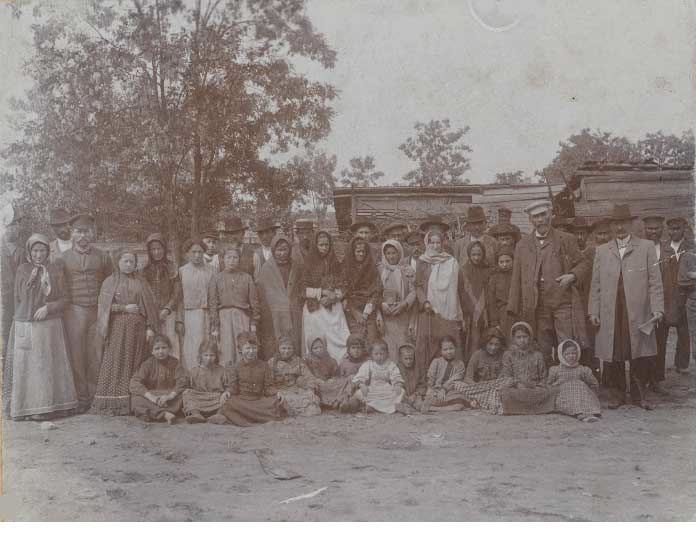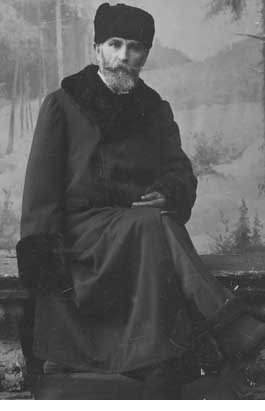
Survivors of the Kishinev pogrom, from a photograph in Michael Davitt's collection
MICHAEL DAVITT
Bernstein-Kogan was at the top of Michael Davitt's list of people to meet when he arrived in Kishinev. Davitt had been commissioned to report on the pogrom for William Randolph Hearst's paper The New York American. Solzhenitsyn is unimpressed: 'But it was by far the European and American press which showed itself to be the most virulent (notably the press magnate William Hearst).' He quotes the Jewish Chronicle referring to the pogrom as a 'holocaust' and imploring 'the God of Justice to come down and finish with Russia as He finished with Sodom and Gomorrah ... and that he remove from the face of the Earth this centre of pestilence.' (p.366, quoting from the Jewish Chronicle 15th and 22nd May 1903. My translation of a French translation of a Russian translation. I'm not in a position to consult the English original).
While on his way to Kishinev, Davitt found himself 'by coincidence ... travelling in a sleeping car on a seat across from the British businessman and Marxist politician (the author of the first introduction to Marx in the English language) Henry Hyndman' (Zipperstein, p.120). According to Zipperstein, following Hyndman's Memoirs, they had an interesting exchange, beginning with Davitt's observation that 'There is not a police bureau in Europe [that] would believe this was an accidental meeting.'
Zipperstein continues:
'The gist of what Hyndman took away regarding Davitt’s views of Jews was that, while he felt great antipathy for those responsible for the massacre, he saw Jews as fanning discontent or worse. “Undoubtedly, Davitt in private while not excusing the Russian authorities felt that Russia would be much better off if she had no Jews at all in her boundaries.” ... He never did rationalise their oppression, but it was a sufficient argument for Jewish mass migration elsewhere - preferably, as Davitt would come to see it, to Palestine.'
Despite his suggestion that 'Hyndman might have exaggerated Davitt’s antagonism to Jews in light of his own jaundiced opinions: “Anglo-Hebraic empire in Africa” was how he referred to South Africa', Zipperstein says: 'In a bloated six-hundred-page tome published in 1902, The Boer War for Freedom, he [Davitt] singled out as prime exploiters of the beleaguered South African region no fewer than forty “Anglicised and German Jews” who, alongside Cecil Rhodes, were “the capitalist kings” most responsible for oppression of the Boers. Davitt never entirely turned his back on such notions: In the preface to his Kishinev book, written the following year, he states: “Where anti-Semitism stands in fair political combat . . . or against the engineers of a sordid war as in South Africa . . . I am resolutely in line with its spirit and programme.”'
Davitt seems to be among those - like Solzhenitsyn himself, Plehve, Churchill and the SS Commander Baron Leopold Edler von Mildenstein (5) - who believed that the presence of Jews was a problem for the people among whom they lived and that the solution was the formation of a Jewish state, with Palestine as the obvious choice of territory. By Zipperstein's account he became something of a folk hero among New York Jews.
(5) Yakov M.Rabkin: What is modern Israel?, Pluto Books, London, 2016, p.93, discusses his enthusiasm for Palestine as the solution to Germany's Jewish problem.
After describing a play called Kishineff, whose hero, 'a naive and good-hearted journalist from the United States, whose courage is all the more impressive since he was one-handed' (as was Davitt), Zipperstein continues (p.105):
'he was responsible for the most harrowing - certainly the most widely read - accounts of the Kishinev pogrom, all of which were sympathetic to the Jewish victims, which catapulted him to meteoric fame. He was the inspiration for several other plays, too, as well as Yiddish poetry. His untimely death in 1906 would be treated much like the death of a holy martyr, marked by Jewish commemorative events attended by huge appreciative crowds.'

Davitt in Russia